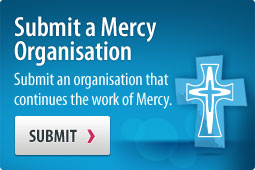Find an organisation that continues the work of Mercy.
Mount Saint Agnes Theological Centre For Women
History
In the summer of 1991, the newly formed Institute of the Sisters of Mercy met in chapter and adopted a statement which reads, in part, as follows: "We commit our lives and resources…to solidarity with women seeking the fullness of life and equality in church and society."
Thinking that such a bold commitment deserved to be embodied in an institution, Mary Aquin O'Neill, RSM, wrote a proposal for a theological center for women. She refined the idea by showing the proposal to numbers of women, lay and members of religious congregations. Mary Aquin received a positive response and an initial seed grant from the Sisters of Mercy, Baltimore, to whom she had submitted the proposal. The Sisters of Mercy also offered the use of the Provincial House, a building on the grounds of the original motherhouse, Mount Saint Agnes, to which the sisters still had access.
Mary Aquin then persuaded her friend, Diane M. Caplin, who was in the final stages of completing a doctorate in philosophy, that (should she be willing to work basically for "the love of God") she could help open the center and finish her dissertation in the first year. They named the center Mount Saint Agnes Theological Center for Women to honor and continue the 125 years of first-rate education offered under that name in Baltimore.
Diane and Mary Aquin arrived in Baltimore and took up residence at the Provincial House on August 15, 1992 (Feast of the Assumption of Mary). Thus, the opening of the Center. In May, 1993, Diane earned her Ph.D.
Vision Statement
Mount Saint Agnes Theological Center for Women is founded on the Direction Statement of the Institute of the Sisters of Mercy of the Americas: to commit our resources in solidarity with women seeking fullness of life and equality in church and society. We believe that one of the most important ways to realise this solidarity is to create teaching/learning communities of women knowledgeable about our own living faith and open to learning about how others live theirs. We trust that such communities of women will engage in the works of mercy, renew traditions of spirituality and undertake reforms of church and society that will contribute to fullness of life for future generations.
Mission Statement
Our mission is to educate in community. Here each woman who so desires may study, interpret, formulate, and learn to teach an inclusive Christian theology. The aim is to develop her voice and to further fullness of life and equality for women in church and society. Through programs on site, off site (by invitation), and in cyberspace, the Centre provides stimulating content for adult learners. Where appropriate, men are included.
Mount Saint Agnes Theological Center for Women Today
Our mission is accomplished by honoring the following values:
- hospitality, intellectual curiosity and creativity
- prayer informed by the language of women
- teaching methods appropriate for adults
- home and family
- quality in intellectual content, pedagogical method, teachers and speakers
- the corporal and spiritual works of mercy
- collaboration between vowed religious and other laywomen
- a just wage for all employees and benefits for those in need of them



